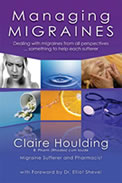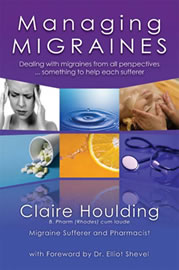Questions about the Author

Q1. What made you write Managing Migraines?
A: Being a sufferer myself I have had an interest in the treatments of migraines for many years. I have been at the stage where I have known no better and have despaired over my pain, so I know exactly what other sufferers are going through. I have tried and researched a large range of treatments, from both a medical as well as a non-medical point of view and thereby found that there are so many diverse treatment alternatives available. This helped me in finding my own cure and also gave me the tools with which to help many inadequately treated sufferers that I have since come into contact with daily as a pharmacist. I looked at the books that are available on migraine treatments and found that most of them will only speak about one treatment as if there are no others available. This was a source of frustration to me before and I have seen the despair in so many sufferers out there. Managing Migraines describes everything a migraine sufferer needs to know about their migraines objectively and comprehensively. I would have loved help of this nature many years ago!
Q2. Have you found a cure for your own migraines? How did you go about finding it?
A: It took me many years to find something that worked. I was diagnosed with migraines as a young child and only when I started studying my pharmacy degree did I realize that there was a whole host of treatments out there. As a child I was placed on numerous regimens, some of which caused severe side-effects. Some treatments didn’t work at all and made matters worse. This made me more sympathetic to sufferers who have inadequately treated migraines- I have been there. I started keeping a migraine diary, cut out foods that are known trigger factors, and tried many different remedies for reasonable lengths of time to see if they worked. I eventually found that homocysteine modulators worked really well for me and brought down my migraines from up to 12 monthly to sometimes not even a single one per month. Omega 3 essential fatty acids also worked, but caused me side-effects. For acute migraines I still have an anti-inflammatory like Ibuprofen and, for worse cases, a Triptan on hand. They work really well for me on the odd occasion that I now get a migraine. They have very few adverse effects and allow me to return to a normal day’s work within half an hour. I also know what triggers my migraines and attempt to avoid these as best as I can. Lifestyle changes and eliminating trigger factors made the most difference to the severity and frequency of my migraines. It took a lot of trial and error, a lot of research, patience and perseverance, but it definitely paid off.
The Author | Q3 & Q4 >>





